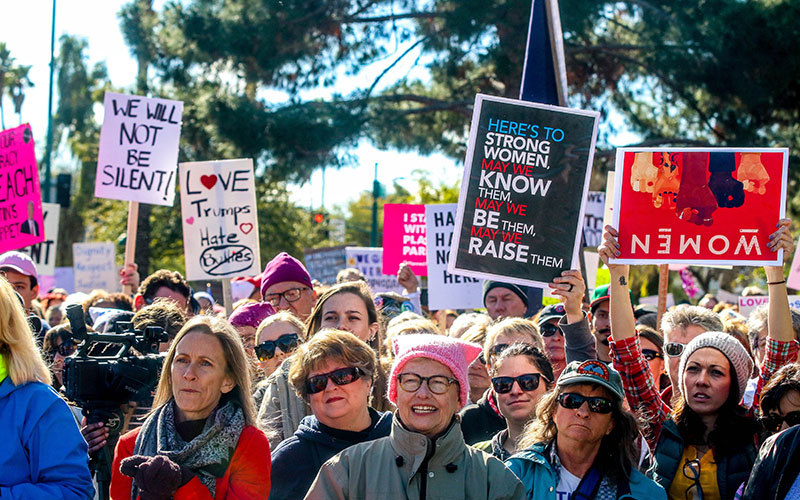
Marchers in the streets of Phoenix joined thousands of people in Arizona, the U.S. and across the world in solidarity of the Women’s March on Washington. (Photo by Saeed Alshamisi/Cronkite News)
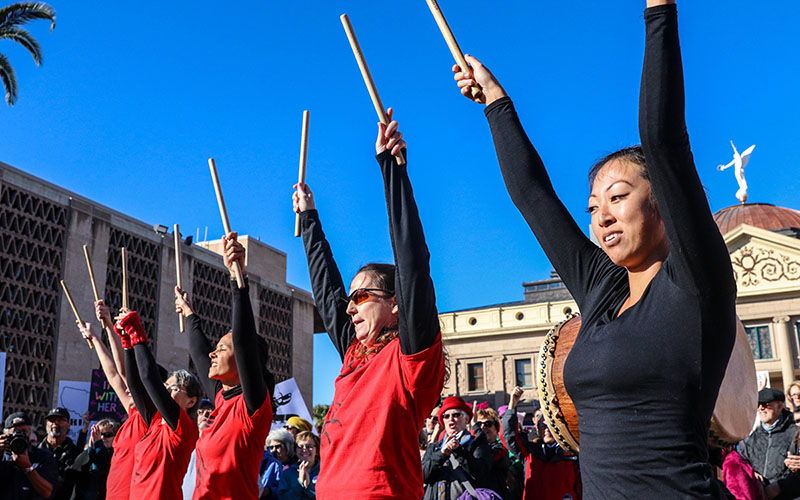
Performers from a drumming circle roused marchers at the Arizona State Capitol. (Photo by Saeed Alshamisi/Cronkite News)
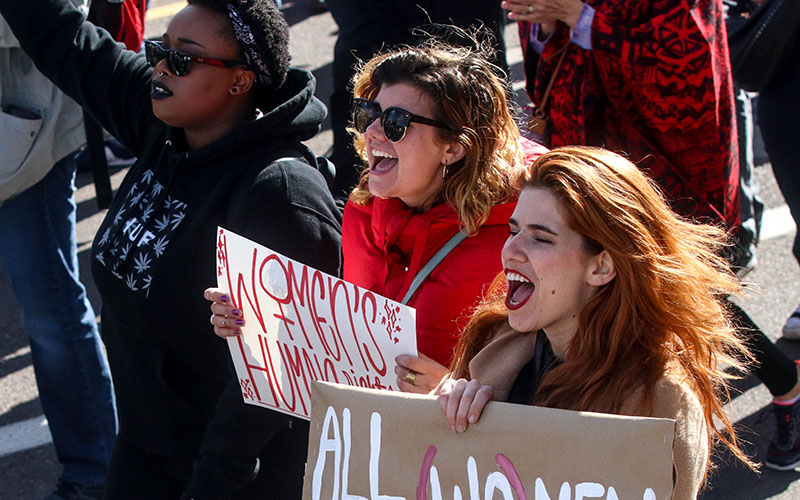
Three women marching side-by-side in solidarity for women around the globe. (Photo by Saeed Alshamisi/Cronkite News)
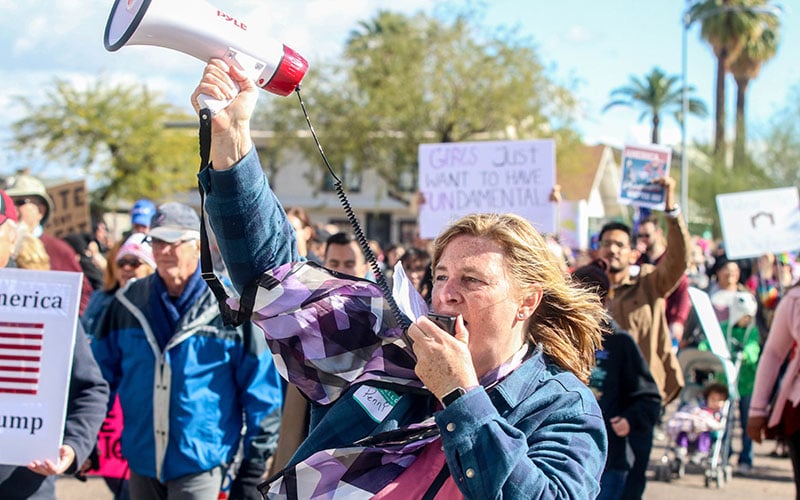
A marcher shouted in support of women’s issues at a Phoenix march in solidarity with the Women’s March on Washington. People marched in several Arizona cities and towns. (Photo by Saeed Alshamisi/Cronkite News)
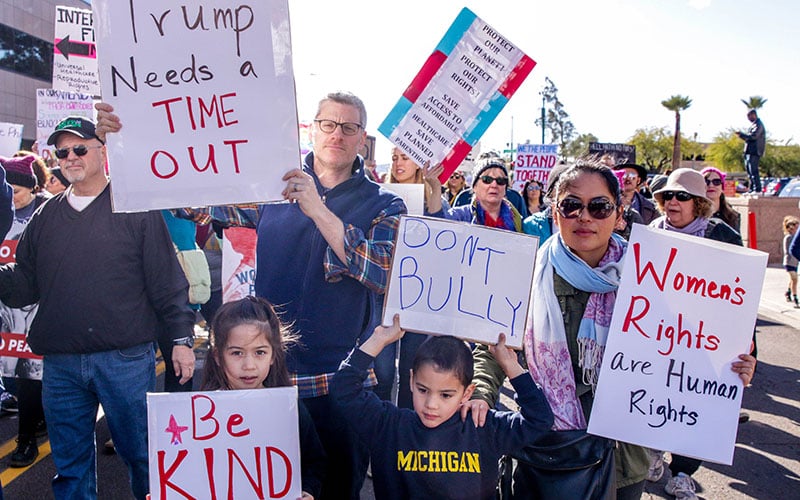
A family marches together at a women’s rights rally in Phoenix, conducted in cities and towns across Arizona in support of the Women’s March on Washington. (Photo by Saeed Alshamisi/Cronkite News)
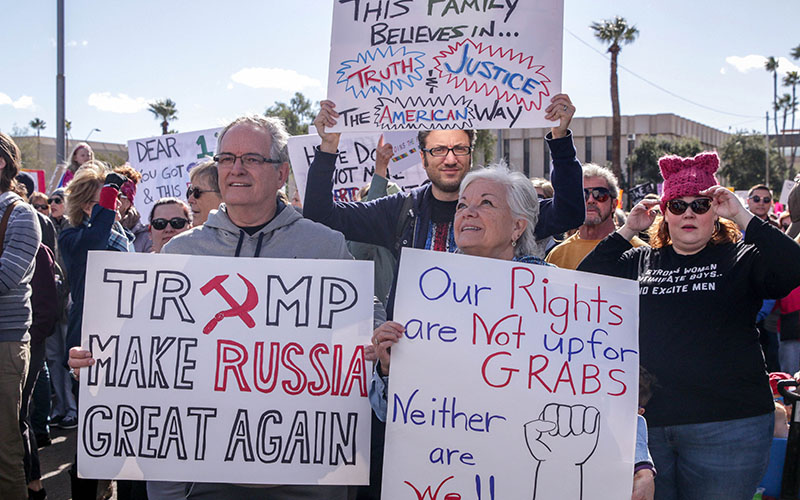
A family shows signs showcasing their views at a Phoenix march in support of the Women’s March on Washington. (Photo by Saeed Alshamisi/Cronkite News)
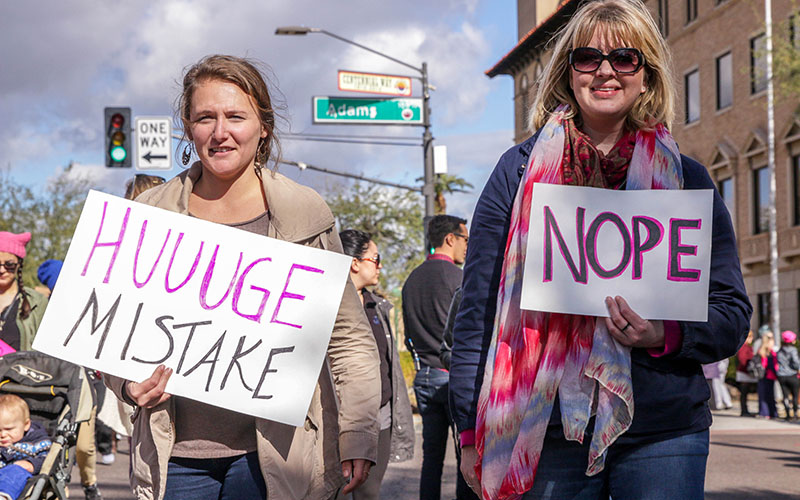
Anti-Trump marchers at a Phoenix rally Saturday show their disagreement with President Donald Trump. (Photo by Saeed Alshamisi/Cronkite News)
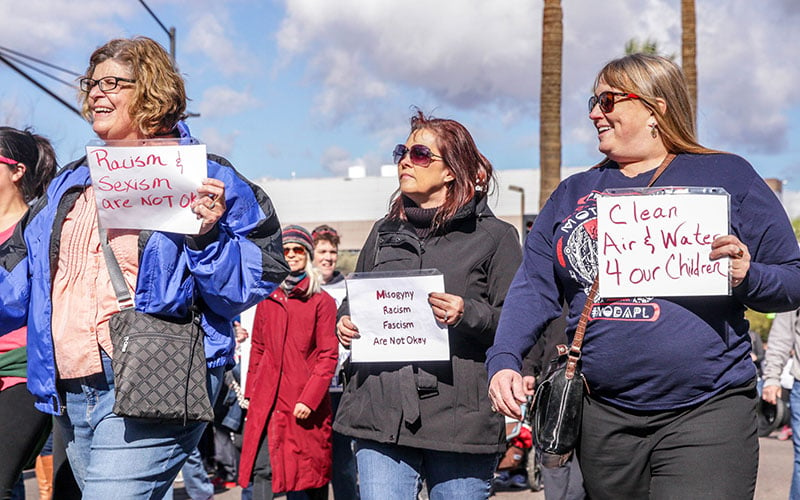
Three friends advocate for clean air and water and a stop to racism and misogyny during a Phoenix march in solidarity with the Women’s March on Washington. (Photo by Saeed Alshamisi/Cronkite News)
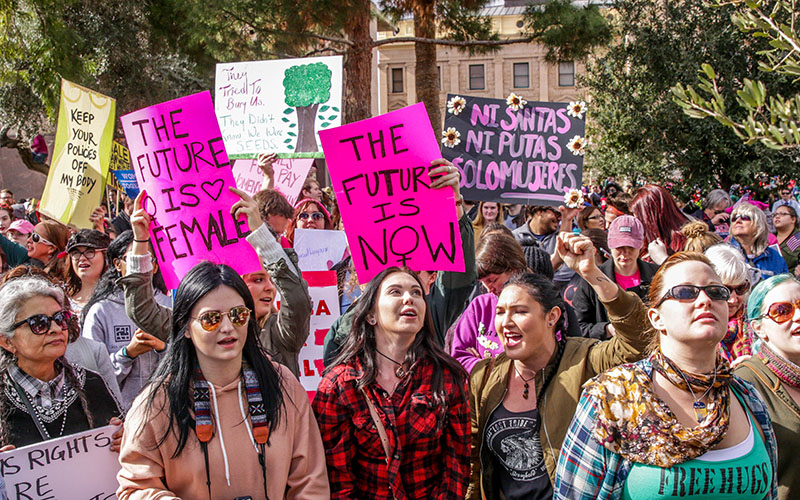
Protestors raise signs in hopes that their voices are heard at the Phoenix march conducted in solidarity with the Women’s March on Washington. (Photo by Saeed Alshamisi/Cronkite News)
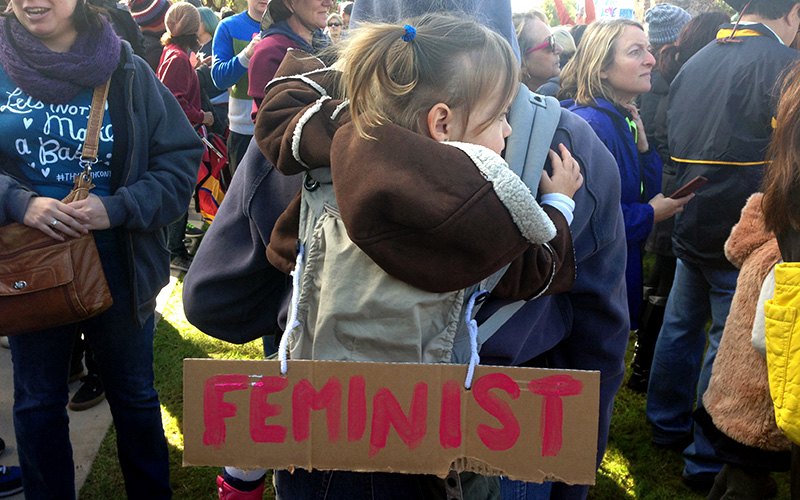
Phoenix mother Gloria Montaño said she wants her four-year-old daughter to celebrate her multi-cultural identity, including Irish and Mexican heritage, as part of the American tapestry. (Photo by Saundra Wilson/Cronkite News)
PHOENIX – One family brought their two children, with the four-year old wearing a cardboard “Feminist” sign as her mother carried her on her back.
The parents said they want their children to know that Arizona and the rest of the country welcomes people with multi-racial identities.
A 60-year-old man, separated from his daughter by thousands of miles, marched in Phoenix while his daughter marched with thousands of others in the Women’s March on Washington. His great-grandmother fought in the 1850s for the right for women to own property in California and wants a future where men and women who support women’s rights will be routinely elected to Congress.
More than 20,000 marchers wearing pink hats and carrying signs marched for the past, the present and a future that recognizes women’s rights at the at the Arizona State Capitol on Saturday. They joined thousands of others across Arizona, the nation and world in solidarity with the march in the nation’s capital.
“I definitely think that now the conversations are starting to change in Arizona, which to me is a good sign, especially since it’s moving toward more inclusive conversations,” said Rawa Awad of Chandler, who went to the march with her best friends.
Crowds chanted “This is what democracy looks like,” and “Women’s rights are human rights,” reaching a loud roar.
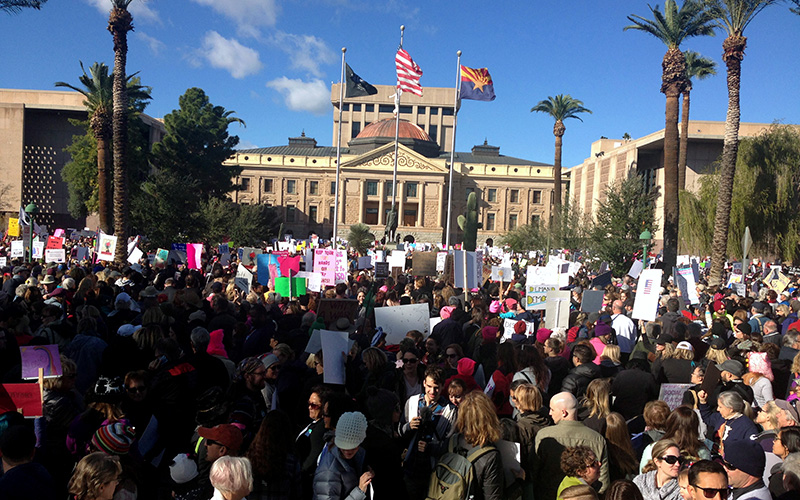
Marchers packed grounds at the Arizona State Capitol, held in solidarity with the Women’s March on Washington. (Photo by Saundra Wilson/Cronkite News)
The march united thousands of Arizonans on the morning of Donald Trump’s first full day as President of the United States, calling for the protection of “our rights, our safety, our health and our families,” according to the Facebook page of the Phoenix march organizers.
Rally participants called for inclusivity, respect and equal rights for all people, with some expressing their concerns about the Trump administration’s willingness to embody those values.
The day after the Washington march, Trump tweeted: “Peaceful protests are a hallmark of our democracy. Even if I don’t always agree, I recognize the rights of people to express their views.”
“Sometimes, somebody has to stand up and if you’re there, you just have to stand up,” said Kristy King, one of five Arizona women who organized the Phoenix march.
King, an Arizona State University professor, said she’s always been a “rebel rouser” and, even though she is a novice at planning large events, was eager to help.
More than 40 volunteers helped facilitate the one-mile march that started and ended on the Arizona Senate lawn with a rally that included speakers and musical performers.
“We are the noisy majority,” said Rep. Rebecca Rios, D-south Phoenix. Rios, the House minority leader, called for the crowd to stay informed and active in local politics.
Here’s a look at some of the Phoenix marchers:
Jennie Clements, 20, Phoenix
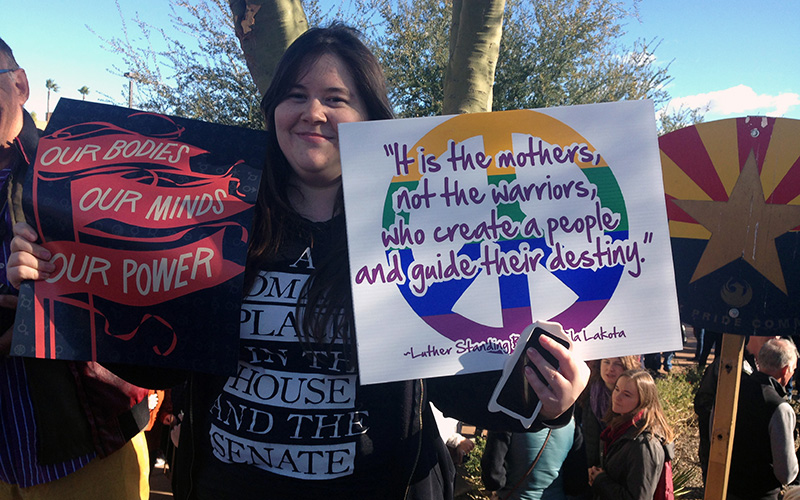
Phoenix College student Jennie Clements, 20, rode the light rail and a city bus to attend the Phoenix march. (Photo by Saundra Wilson/Cronkite News)
Jennie Clements, a Phoenix College student pursuing an associates degree in art, rode the light rail and took a bus to get to the march, meeting other marchers along the way.
“I think I have a tendency to sit in my house, be on Twitter and feel very alone,” Clements said, adding that participating in the march reminded her that people are stronger together.
Clements, who identifies with the LGBTQ community and said she lives with autism, depression and anxiety, was born and raised in Arizona. The state is “generally pretty terrible with civil rights,” she said.
Clements said she would like to see Arizona get rid of abstinence-only education in public schools and has hope that Maricopa County Sheriff Paul Penzone will help strengthen the relationship between law enforcement and the community.
Brent Bishop, 60, Phoenix
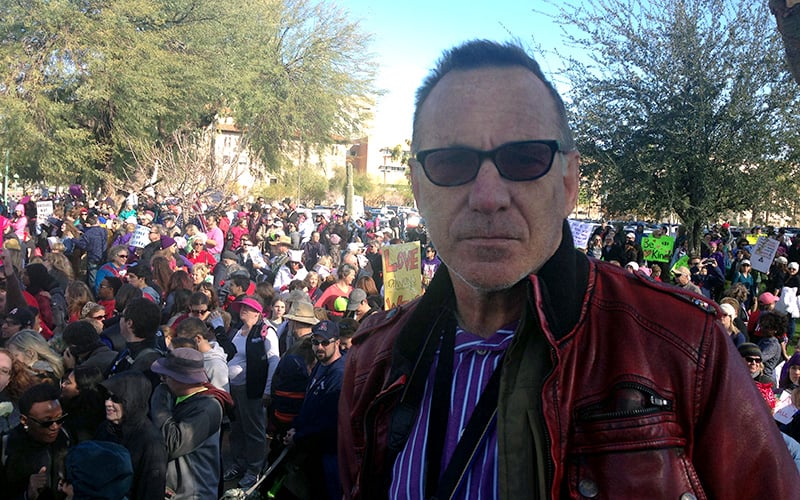
World traveler and photographer Brent Bishop, 60, walked in the Phoenix march to support his daughter, who walked in the Washington, D.C. march. (Photo by Saundra Wilson/Cronkite News)
Brent Bishop travels the world, shooting photos and writing stories. After being in 34 countries last year, Bishop chose to spend Jan. 21 at the Phoenix march.
“Women’s rights have been very important in my family,” Bishop said, adding that his great grandmother immigrated to the United States from Ireland in the 1850s and fought for women to be able to own property in California.
Bishop’s daughter lives in Portland and flew to Washington, D.C. to be a part of the March on Washington and inspired him to attend the Phoenix march in solidarity with her.
His children have told him they won’t visit him in Arizona because of the political climate and because “there’s such reactionaries in Arizona.”
“I can show them now that there are people in Arizona who do care about other people,” Bishop said.
Bishop, who has lived in Phoenix for five years, said he thinks it’s important to elect Congressmen and women in Arizona who care about women’s rights and human rights.
Gloria Montaño, 38, and Sean Greene, 45, Phoenix

Gloria Montaño, 38, and Seean Greene, 45, celebrate their biracial family at the Phoenix women’s march. (Photo by Saundra Wilson/Cronkite News)
“I came here to make sure that part of America includes what my family looks like, which is a biracial family,” Montaño said.
Montaño and Greene brought their 4-year-old daughter and one-year old son to the march, saying that they want to set an example for their children and show them “the things I teach them at home are the things that I expect to be in government as well.”
That means, as their 4-year-old said, to “play nice and be nice,” according to Greene, who is a stay-at-home dad at their Phoenix home.
The couple supports Planned Parenthood and Montaño said that while she has never used its services, her husband has.
Greene said his mother used to work there so he received his physical exams there growing up.
Montaño, who grew up in west Phoenix, said she thinks Arizona is “becoming a little more thoughtful and pragmatic.” They pointed to the presidential election, saying Trump did not win Arizona by a landslide. (Trump won 49 percent of the vote, compared to about 45 percent for Hillary Clinton.)
Greene said he would like to see Arizona voters elect more Latinos and Native Americans to public office.
Rose Mapendo, 53, Phoenix
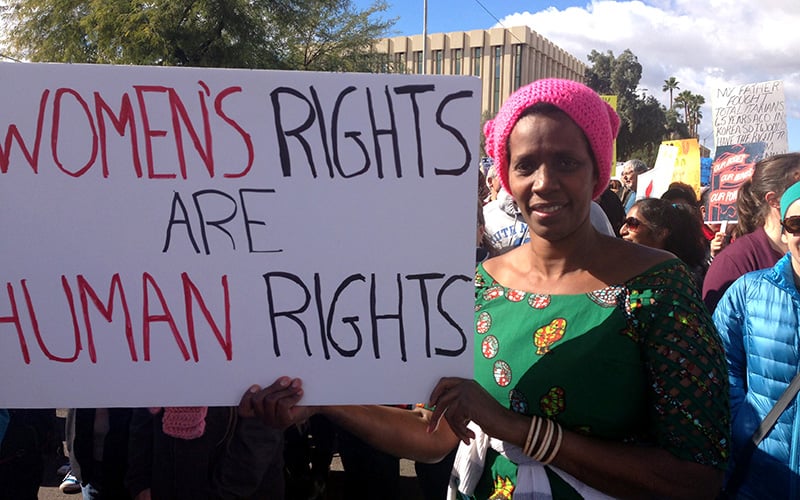
Human rights activist Rose Mapendo sports a pink hat”and dress from her native Congo at a Phoenix march in solidarity of the Women’s March on Washinton. (Photo by Saundra Wilson/Cronkite News)
Rose Mapendo, a human and women’s rights activist, said she marched to represent African men and women and support the country.
“When you neglect a woman, you neglect your family,” Mapendo said.
She fled her homeland in the wake of a genocide in 1994 in which her husband was killed. The Congolese mother of 10 has lived in the United States for 16 years.
Mapendo runs a foundation that helps Congolese people emigrate to the U.S. The organization helps them find health care and provides support for survivors of trauma and violence.
“When we come here they think we are trash, they think we are nothing,” Mapendo said. “No, we are something.”
Casey Knapp, 38, Gilbert
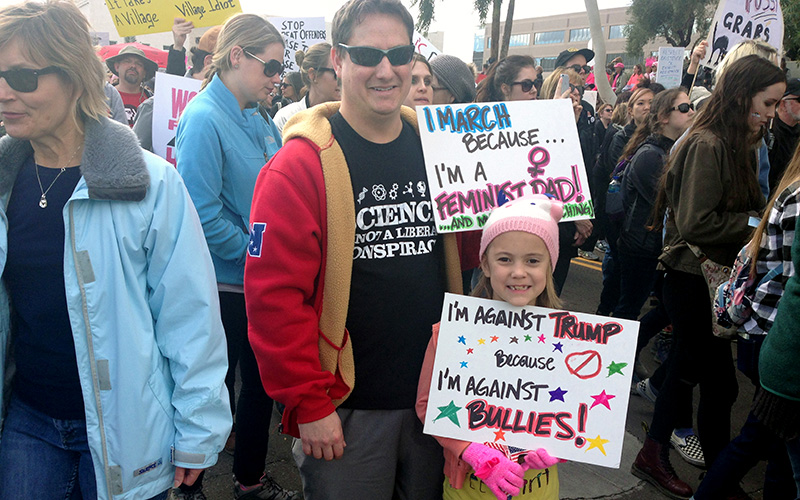
Gilbert father Casey Knapp, 38, stands with his 7-year-old daughter, who made her own sign. (Photo by Saundra Wilson/Cronkite News)
The Phoenix march was a family affair for Casey Knapp. The father of three attended the march with his wife, 7-year old twin daughters and his son as well as his brother, sister-in-law and their three children, who are 9, 7 and five.
“Our kids are at an age where they’re picking things up and so we just felt like we need to make our voices heard,” Knapp said.
Knapp’s twin daughters made their own signs for the march.
Knapp, who has lived in Arizona for three years, said Arizona has improved but residents still need to show more empathy and be introspective.
Elizabeth Holmes, 54, Mesa
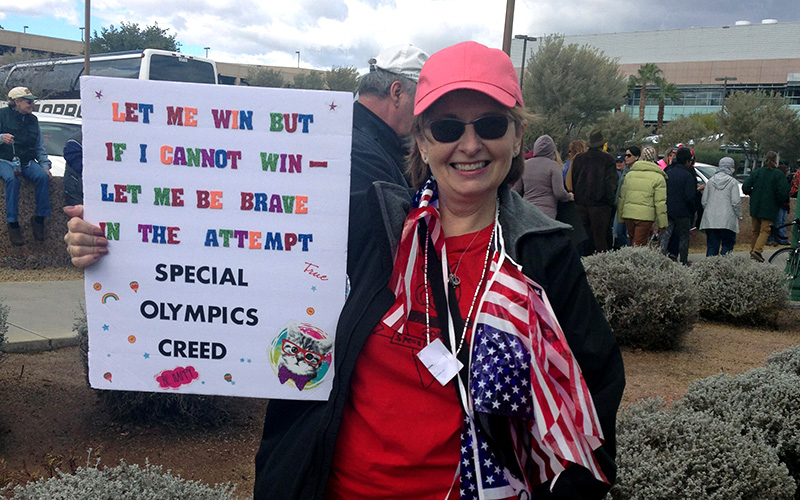
Former special education teacher Elizabeth Holmes, 54, holds a poster to showcase Special Olympic students. (Photo by Saundra Wilson/Cronkite News)
Elizabeth Holmes wrapped herself in a plastic American flag as she marched through downtown Phoenix. Holmes said this was the first time she’s worn the flag and did it as a symbol of reclaiming her identity as a Christian liberal.
“I don’t think Arizona’s a great place to be liberal at all,” said Holmes, who has lived in Arizona for 35 years.
The former special education teacher said she’s marching for her students and displayed the special Olympics creed on her glittery sign.
Rawa Awad, 29, Chandler, and Nadia El-Hillal, 29, south Phoenix
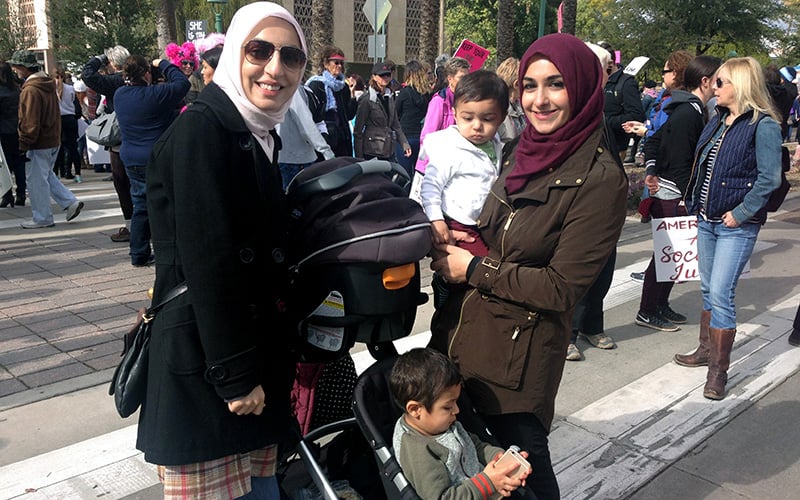
Best friends Rawa Awad, 29, and Nadia El-Hillal, 29, attended the march with El-Hillal’s sons to “make sure that we’re a part of history.” (Photo by Saundra Wilson/Cronkite News)
Rawa Awad and Nadia El-Hillal met at a mosque about four years ago and became best friends. The two women marched with El-Hillal’s two young children to set an example for the boys.
“I think it’s really important to stand up and not be silent right now because if we do, people will start speaking for us,” El-Hillal said.
Awad said she came to stand in solidarity with people who are hurting and scared of the future.
“When you don’t feel safe in your own country that’s something that’s a concern to me regardless of what that issue is,” Awad said.